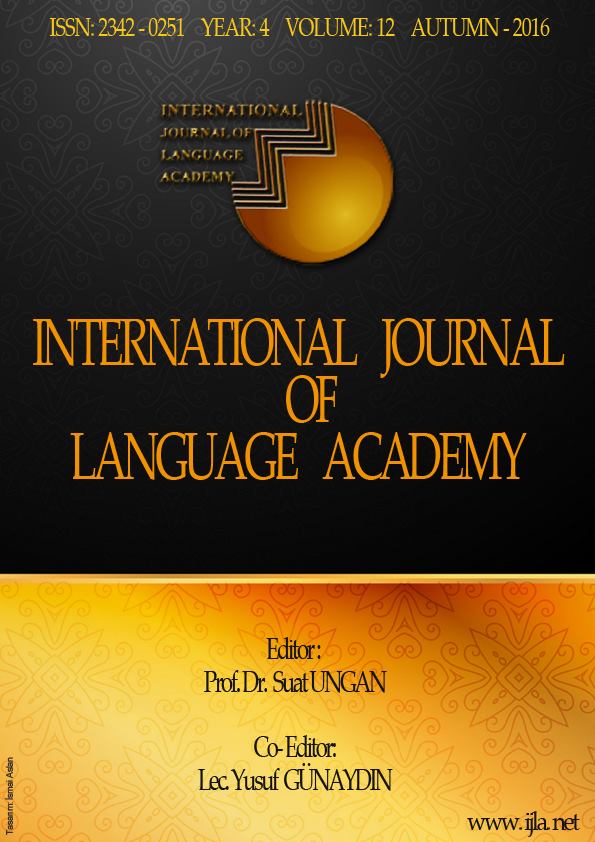Author :
Abstract
Bir edebî ekolün veya sanatsal anlayışın gelişim, değişim ve başkalaşım süreci, mekân ve insan unsurları ile bunların taşıdığı koşullardan bağımsız değildir. Zira felsefi, siyasal ve sosyolojik akımların oluşumunda ve farklılaşmasında döneme ait mekânların ve toplumsal koşulların büyük payı vardır. Edebiyatımızda 1940 sonrası gelişen yeni kuşak şairlerin toplumcu şiir anlayışının beslendiği kaynak da budur. Yaşadığı dönemin köy ve köylü gerçeğine mekân ve insan unsuru bağlamında şiirleriyle ayna tutan edebî şahsiyetlerden biri de Talip Apaydın’dır. Talip Apaydın (1926-2014), roman, öykü, anı ve tiyatrolarında olduğu gibi şiirlerinde de Anadolu’nun kırsal coğrafyasını sorunlarıyla birlikte dile getiren “Toplumcu Gerçekçi / Sosyalist Gerçekçi” akımın önde gelen temsilcilerindendir. Şiirden edebiyatın ve sanatın her alanına geniş bir yelpazede etkisini gösteren toplumcu anlayış, sanatkâra gördüklerini, fark ettiklerini gerçekçi biçimde betimlemeyi esas alır. Apaydın, bu anlayışla öykü ve romanları yanı sıra şiirlerinde de doğa betimlemeleriyle birlikte köy ve kasaba çevrelerini, insan ilişkilerini kendi doğallığı içinde ele alır.Edebiyatta yazı hayatına toplumcu şiirlerle başlayan Apaydın’ın Susuzluk (1956) ve Kırsal Sancı (1999) olmak üzere iki şiir kitabı bulunmaktadır. Bu eserlerde yer alan şiirler, 1940 sonrası Anadolu’nun köy ve kasaba muhitleri ile buralarda mukim yoksul kesim hakkındaki yerleşik algının izahıdır. Şiirlerde dile getirilen mekân, sanatçının her ne kadar çok iyi tanıdığı Polatlı, Eskişehir, Beypazarı yöreleri ve çevre köyleri ise de, aslında dönemin Anadolu taşrasının genel görünümünü yansıtmaktadır. Apaydın, bir önceki dönemde köye kentten bakan aydınların aksine dışarıdan değil, içeriden bakar. Şiirlerinde görsel imajlardan çok kokusal, işitsel imajların öne çıkması da bu yüzdendir. Anlatılan taşra, Cumhuriyet ideolojisinin ideal taşrası olmaktan uzaktır. Bu bağlamda dikkatlere sunulan taşra sorunsalı, kırsaldaki insanların yoksullukları, yaşanan toplumsal eşitsizlikler, idarî ve sınıfsal çelişkilerdir.
Keywords
Abstract
The evolition , the change and the metamorphosis process of a literary school or social mentality depend on place and human element ,of course, the conditions of these.So the place and the social conditions ,belonging to that period ,have an important role in the formation and the differentiation of the political and sociological movement.The socialist poetry concept of the new generation poets ,who occured in our country after 1950s ,is correlated with this.Talip Apaydın is one of these who reflects the truth of village and peasant in the context of the place and the human element, in their poems .Talip Apaydın(1926-2014) is the prominent of the socialist realistic movement ; who also expresses Anatolias’ rural geography with its troubles in his poems as in his novels , stories , memories and his plays. Describing what was seen and recognized by the artist realistically is the main factor in the socialist concept which has affected every aspects of literature and art with poetry.With this mentalitiy , Apaydın also deals village and town environments , human relationships with descriptions of the nature in its own naturalness in his poems as well as his stories and novels.Apaydın , starting the literature with the socialist poems , has two poetry books called “Susuzluk”(1952) and “Kırsal Sancı(1999). The poems in this works are the explanation of the perception about the villages and the towns in Anatolia after 1950, and the people living in there. Although the place expressed in the poems is the regions ,where the artist knows very well like Polatlı ,Eskişehir , Beypazarı ; it actually reflects the general view of backwoods in Anatolia of that term. Apaydın describes his works with the perspective of a peasant , not with the perspective of a townsman unlike other poets in the previous term. So in his works ; the auditory , sentimental and olfaction images have more priority rather than visual images. The described backwoods is not the ideal backwoods of the republican ideology.The problem highlighted about the backwoods in this context, is the poverty of the people in rural , experienced social inequalities , administrative and class contradictions.
Keywords
- Alangu, T. (1968). 1967 Yılında Roman ve Hikâyemiz.Varlık Yıllığı, S.19, s.53-65.
- Alangu, T. (1968). 1967 Yılında Roman ve Hikâyemiz.Varlık Yıllığı, S.19, s.53-65. Apaydın, T. (1952) Bozkırda günler. İstanbul: Varlık Yayınları.
- Apaydın, T. (1956). Susuzluk, İstanbul: Varlık Yayınları.
- Apaydın, T. (1972). Talip Apaydın. Yansıma, S. 6, s. 45-49.
- Apaydın, T. (1981). Köy Çocuğu. Yazko Edebiyat, S. 9, s. 36-41.
- Apaydın, T. (1990). Köy enstitüsü yılları. İstanbul: Çağdaş Yayınları. Apaydın, T. (1991). Neden, niçin, nasıl. ABeCe, S. 61, s. 23-30.
- Apaydın, T. (1999). Kırsal sancı Ankara: Güldikeni Yayınları.
- Bachelard, G. (1996). Mekânın poetikası, (Çev:Aykut Derman), İstanbul: Kesit Yayıncılık.
- Balkız, A. (1999). Köyün ve köylünün romancısı Talip Apaydın. Evrensel Kültür, S.17, s.22-28.
- Bayrak, M. (1975). Sanatçı toplum ilişkisi. Öykü, S. 3, s. 26-29.Binyazar, A. (1969). Talip Apaydın’la. Varlık, S.743, s.11-17.
- Cengiz, M. (2000). Toplumcu gerçekçi şiir 1923-1953. İstanbul: tümzamanlaryayıncılık.Çoruk, A. Ş. (1995).Cumhuriyet Dönemi Türk Romanında Beyoğlu. İstanbul: Kitabevi Y.Detlev, C. (2012). Son Deha- Theodor W. Adorno, (Çev. D. Muradoğlu), Ankara: YKY.
- Ergül, M. S. (2009). Türk şiirinde taşra: 1859-1959. Bilkent Üniversitesi Ekonomi veSosyal Bilimler Enstitüsü, Türk Edebiyatı Bölümü Yayımlanmamış Doktora Tezi, Ankara
- Erol, K. (2015). Hayatı, sanatı, roman ve öyküleriyle Talip Apaydın, Ankara: Akçağ Y.
- Gezer, N. (2000). Talip Apaydın’la ‘Kırsal Sancı’ ve Köy Enstitüleri’nin 60. Yılı üzerine Söyleşi. Cumhuriyet Kitap, 20 Temmuz 2000.
- Hölderlin, F. (1997) Seçme şiirler, (Çev: A.Turan Oflazoğlu). İstanbul: İz Yayınclık.
- Kaplan, R. (1997). Cumhuriyet Dönemi Türk Romanında köy. Ankara: Akçağ Yayınları.
- Karaömerlioğlu, A. (2006). Orada Bir Köy Var Uzakta: Erken Cumhuriyet Döneminde köycü söylem. İstanbul: İletişim Yayınları.
- Kierkegaard, S. (2002). Baştan çıkarıcının günlüğü, (Çev. Süha Sertabiboğlu). İstanbul: Ayrıntı Yayınları.
- Korkmaz, R. (2007). Romanda mekânın poetiği. Edebiyat ve Dil Yazıları Mustafa İsen’e Armağan, (Ed: Ayşenur Külahlıoğlu İslam-Süer Eker), Ankara.
- Köksal, A. (1969). Talip Apaydın’la, Türkiye’nin haritası geleceğe göre yapılmamış. Papirus, S:34, s.68.74.
- Narlı, M. (2007). Şiir ve mekân. Ankara: Hece Yayınları.
- Özdemir, E. (1981). Gerçekçilik. Türk Dili: Dil ve Edebiyat Dergisi Yazın Akımları Özel Sayısı, Doğumunun 100. Yılında Atatürk’e Armağan, S.349, s.145).
- Susan, S. (1991). Sanatçı: Örnek bir çilekeş, (Çev. Y. Salman- M. Gürsoy). İstanbul: Metis Yayınları,
- Tütengil, C. O. (1969). Türkiye’de köy sorunu. İstanbul: Kitaş Yayınları.





